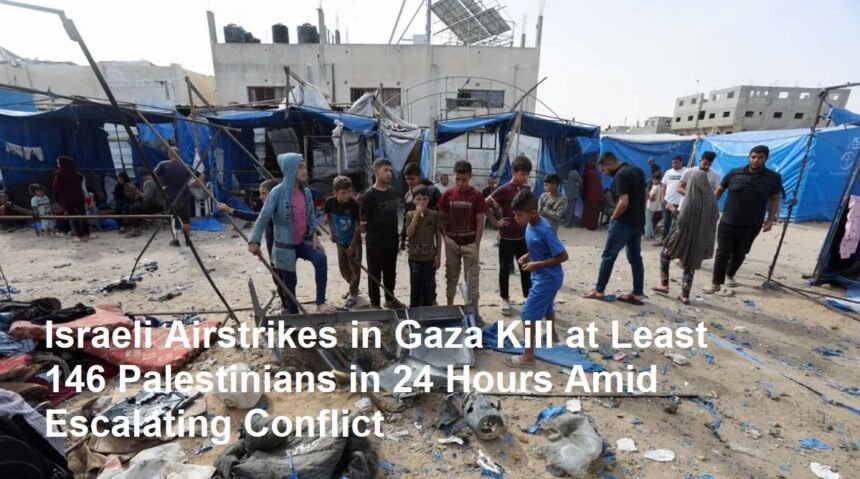In the past 24 hours, the Israeli military has conducted a series of intense airstrikes on the Gaza Strip, resulting in the deaths of at least 146 Palestinian civilians. This latest wave of violence marks one of the deadliest periods in the ongoing conflict between Israel and Palestinian groups, further exacerbating an already dire humanitarian situation in the region.
The airstrikes targeted multiple locations across Gaza, including residential neighborhoods, infrastructure, and sites believed to be used by militant groups. The Israeli Defense Forces (IDF) stated that the operations were aimed at neutralizing threats posed by armed factions in Gaza, which have been launching rocket attacks into Israeli territory. However, the high number of civilian casualties has drawn widespread condemnation from international organizations and human rights groups.
The Gaza Strip, home to over two million Palestinians, has been under a blockade and frequent military confrontations for years. The densely populated area is particularly vulnerable to airstrikes, with limited access to medical facilities, clean water, and basic necessities. The recent escalation has overwhelmed hospitals and emergency services, leaving many injured without adequate care.
International reactions to the airstrikes have been swift and varied. The United Nations and several countries have called for an immediate ceasefire and urged both sides to return to negotiations to prevent further loss of life. Humanitarian agencies have highlighted the urgent need for aid and protection for civilians caught in the crossfire. Meanwhile, some governments have reiterated Israel’s right to defend itself against attacks but stressed the importance of proportionality and minimizing civilian harm.
The conflict between Israel and Palestinian groups in Gaza has deep historical roots, involving complex political, territorial, and religious issues. Periodic escalations of violence have resulted in significant casualties and destruction, with peace efforts repeatedly stalling. The current surge in hostilities reflects longstanding grievances and unresolved disputes that continue to fuel tensions.
The humanitarian impact of the recent airstrikes is severe. Thousands of families have been displaced as homes are destroyed or rendered unsafe. Access to electricity, water, and medical supplies has been severely disrupted, compounding the suffering of the civilian population. Aid organizations face challenges in delivering assistance due to security concerns and restrictions on movement.
Efforts to de-escalate the situation are ongoing, with diplomatic channels working to broker a ceasefire. Regional actors and international mediators are involved in negotiations to halt the violence and address the underlying causes of the conflict. However, the path to peace remains uncertain amid deep mistrust and competing political agendas.
The loss of life in the latest airstrikes underscores the urgent need for renewed commitment to a peaceful resolution. Protecting civilians and upholding international humanitarian law must be priorities for all parties involved. The international community continues to call for accountability and measures to prevent further escalation.
In conclusion, the Israeli airstrikes in Gaza over the last 24 hours, which have killed at least 146 Palestinians, represent a tragic escalation in a protracted conflict with devastating humanitarian consequences. As the situation unfolds, the focus remains on ending the violence, providing relief to those affected, and seeking a sustainable path toward peace and stability in the region.









